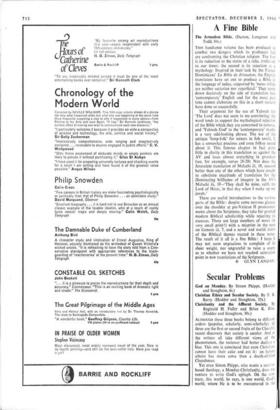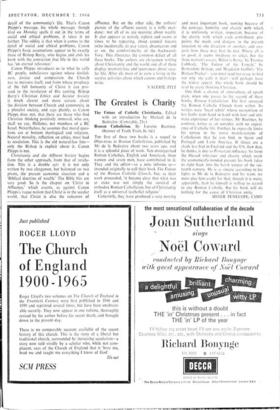Secular Problems
Christian Ethics and Secular Society. By F. R. Barry. (Hodder and Stoughton, 35s.)
Christianity and the Affluent Society. By Reginald H. Fuller and Brian K. Rice. (Hodder and Stoughton, 30s.)
ALTHOUGH these three books belong to different orders (popular, scholarly, semi-scholarly), all three are the first or second fruits of the Church's recent discovery that society is secular. And as the writers all take different views of the phenomenon, the reviewer had better declare a bias. This one is convinced that even Christians cannot have their cake and eat it: an honest atheist has more sense than a death-of-God Churchman.
Yet even Simon Phipps, who wants a sectt'ar- based theology, a Monday-Christianity, does not venture to write God's epitaph. On the con- trary, this world, he says, is one world, Gods world, where He is to be encountered in the detail of the community's life. That's Canon Phipps's message, his whole message; though God on Monday spells it out in the terms of social and ethical problems, it takes it no further. The oddity is that when it comes to the detail of social and ethical problems, Canon Phipps's basic assumptions appear to be exactly those of Bishop Barry, who begins and ends his book with the conviction that life in this world has 'an eternal reference.'
Canon Phipps introduces us to what he calls BC people, unbelievers against whose dutiful- ness, justice and compassion the Church has to measure itself, and from whose prophecy of the full humanity of Christ it can pro- ceed to the revelation of His coming. Bishop Barry's Christian Ethics and Secular Society is much clearer and more certain about the division between Church and community in a pluralist society, and says plainly, as Canon Phipps does not, that there are those who find Christian thinking positively immoral, who are, shall we say, Hellcnes, not members of a BC Israel. Nevertheless, he assumes that moral ques- tions are at bottom theological and religious. Natural morality, reflection on ethics, must lead to revelation. This is the old natural-law line— only the Bishop is explicit about it. Canon Phipps is not.
Christianity and the Affluent Society begins from the other approach, from that of revela- tion. This is a double act: it is not only written by two clergymen, but balanced on two pivots, the present economic situation and a 'Biblical doctrine of wealth.' The Bible bits are very good. So is the chapter on 'Christ in Affluence,' which asserts, as against Canon Phipps's vague notion that Christ is in the secular world, that Christ is also the redeemer of affluence. But on the other side, the authors' picture of the affluent society is a trifle over- done: not all of us are neurotic about wealth. It also appears as naively rightist and seems at times to be repeating, about council tenants (who incidentally do pay rates), absenteeism and se on, the comfort-myths of the backwoods Tory. This illustrates the common defect of all these books. The authors are clergymen writing about Christianity and the world and all of them display insensitivities and ignorances about secu- lar life. After all, most of us earn a living in the secular activities about which canons and bishops write.
VALERIE PITT



































 Previous page
Previous page